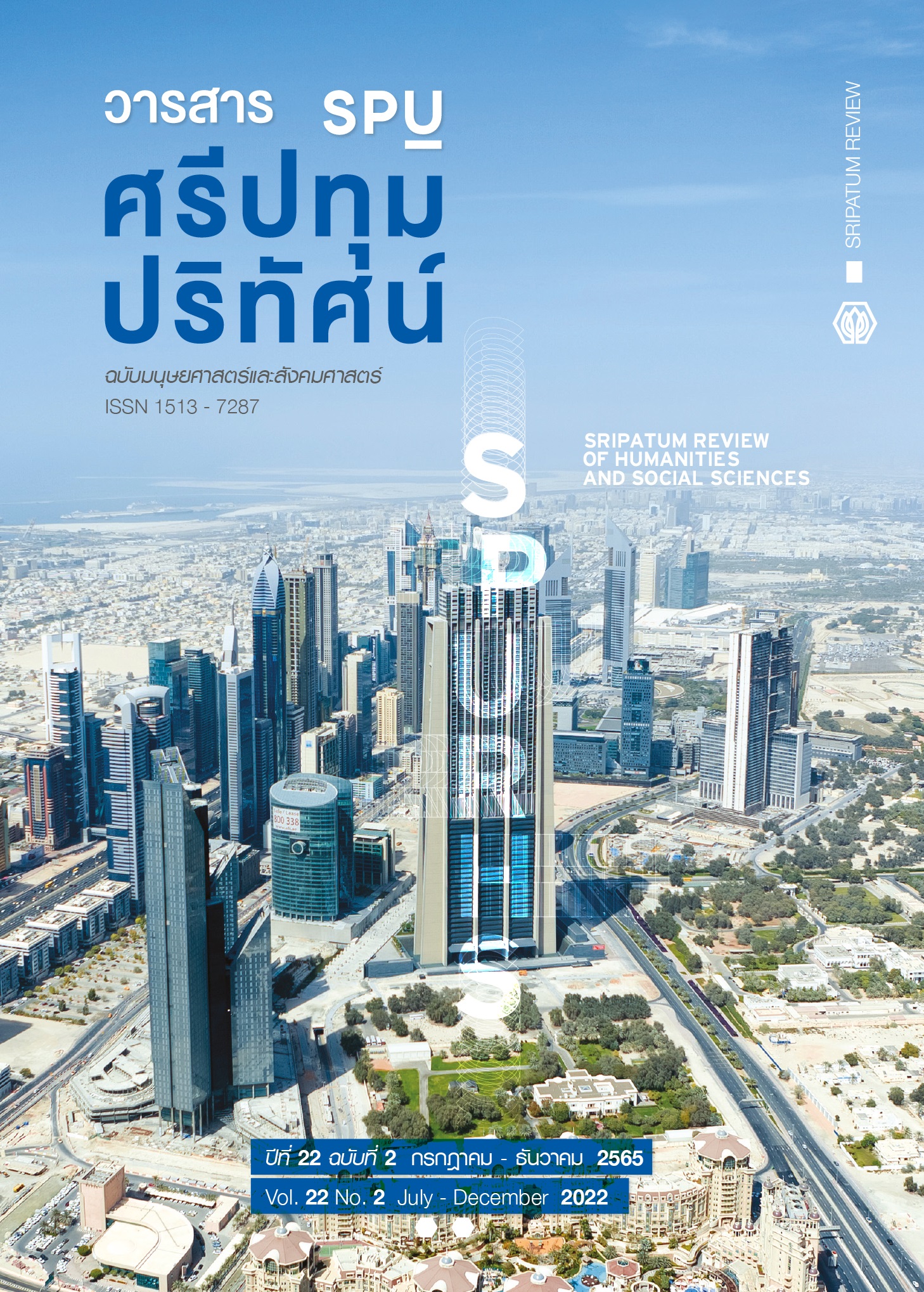Tourism Resource Management of Community-Based Tourism Based on Collaborative Management Concept in Phu Hin Rong Kla National Park: A case study of Ban Rong Kla community, Nakhon Thai District, Phitsanulok Province
Main Article Content
Abstract
The objectives of this research were to present the results of the study about the collaborative management in the resource tourism of Ban Rong Kla community in Phu Hin Rong Kla National Park, Nakhon Thai District, Phitsanulok Province. This study was a qualitative research methodology and using interview guidelines as a tool to collect collect data from key informant group of 43 key informants were selected by purposive sampling. They were divided into four groups as follows: (1) nine people in the community, (2) fifteen tourists, (3) seven committees of Ban Rong Kla community-based tourism, (4) six people from the government sector, and (5) six people from the private sector. Triangulation was used to ensure the credibility of the results. The qualitative data was analyzed with content analysis. The research results were found that Ban Rong Kla community has managed community-based tourism based on the collaborative management concept in 3 dimensions; (1) there is a power-sharing between Phu Hin Rong Kla National Park and the community by giving CBT committees the power to issue regulations in order to take an advantage of resources in the community, (2) in term of responsibility sharing, it was found that the community has participated with Phu Hin Rong Kla National Park to rehabilitate natural resources for sustainable benefit, and (3) sharing a benefit between the National Park and the community by encouraging the community to earn extra income from arranging a queue for tourist transport service to Phu Lom Lo together. Therefore, to increase the capacity of community-based tourism management in Ban Nong Kla community, the community should learn how to use digital technology for communication and apply it in community-based tourism management.
Article Details

This work is licensed under a Creative Commons Attribution-NonCommercial-NoDerivatives 4.0 International License.
1. กองบรรณาธิการสงวนสิทธิ์ในการพิจารณาและตัดสินการตีพิมพ์บทความในวารสาร
2. บทความทุกเรื่องจะได้รับการตรวจสอบทางวิชาการโดยผู้ทรงคุณวุฒิ แต่ข้อความและเนื้อหาในบทความที่ตีพิมพ์เป็นความรับผิดชอบของผู้เขียนแต่เพียงผู้เดียว มิใช่ความคิดเห็นและความรับผิดชอบของมหาวิทยาลัยศรีปทุม
3. การคัดลอกอ้างอิงต้องดำเนินการตามการปฏิบัติในหมู่นักวิชาการโดยทั่วไป และสอดคล้องกับกฎหมายที่เกี่ยวข้อง
References
Berkes, F. (2002). Cross-scale institutional linkages: Perspective from the bottom up. In E. Ostrom, T. Dietz, N. Dolsak, P.C. Stern, S. Stonich, and E.U Weber. (Eds.), The Drama of the Commons (pp. 293-321). Washington, DC: National Academy.
Berkes, F., George, P., and Preston, R. J. (1991). Co-management: the evolution in theory and practice of the joint administration of living resources. Alternatives, 18(2), 12-18.
Bolanos, R. and Antonieta, M. (2014). The role of community-based tourism in sustainable rural development: Case studies from ecuador (Doctorat en Sostenibiltat). Barcelona: Universitat Politecnica de Catalunya.
Department of Tourism. (2018). Strategic Tourism Development Plan for Department of Tourism: Year 2018- 2021. [Online]. Retrieved May 24, 2019, from: https://www.dot.go.th/storage/กลุ่มแผน (in Thai)
Hall, L. S., and Richards, G. (2000). Flying foxes: fruit and blossom bats of Australia. Australia: UNSW Press.
Jentoft, S., McCay, B. J., and Wilson, D. C. (1998). The fisheries co-management experience accomplishments, challenges and prospects. [Online]. Retrieved March 20, 2019, from: https://books.google.co.th/books?id
Laws related to the Department of National Parks, Wildlife and Plant Conservation B.E. 2563. (2020). Royal Thai Government Gazette. Vol.138, Part 2 Special, pp. 31-33. (in Thai)
Linden, R. (2002). A Framework of Collaborating. The Public Manager, 31(2), 3-6.
Maxwell, J. A. (1996). Qualitative research design: An interactive approach. Thousand Oak, CA: Sage.
Miles, M. B., and Huberman, A. M. (1994). Qualitative data analysis. 2nd ed. Thousand Oaks, CA: Sage.
National Park Act B.E. 2562 (2019). Royal Thai Government Gazette. Vol 136, Part 71 Special, p. 150-151. (in Thai)
Nelson, F., and Agrawal, A. (2008). Patronage or participation? Community‐based natural resource management reform in sub-Saharan Africa. Development and Change, 39(4), 557-585.
Office of the Secretary of the National Strategy Board. (2018). Thailand's National Strategy 2018-2037 (Summary Version). [Online]. Retrieved December 19, 2019, from: https://waa.inter.nstda.or.th/stks/pub/2018/20181015-T-0002.pdf (in Thai)
Pampasit, R. (2019). Tourist behavior and economic and social benefits of community tourism: a case study of the lower northern region (Research Project on Tourist Behavior and Socio-Economic Benefits of Community Tourism: Case Study, Lower Northern Region Under a comprehensive community tourism economy education project from social media to tourism communities). Phitsanulok: Faculty of Social Sciences, Naresuan University. (in Thai)
Panyavuttrakul, W. (2019). Highland Sustainable Tourism Management: Phu Lom Lo Case Study and network area. Journal of Liberal Arts, Ubon Ratchathani University, 14(1), 151-197. (in Thai)
Phitsanulok Hotnews. (2018). Pin the boundary line of Ban Rong Kla to separate Phu Hin Rong Kla National Park to clear 830 rai. [Online]. Retrieved April 24, 2022, from: https://www.phitsanulokhotnews.com (in Thai)
Pojjana, P. (2003). Community based tourism handbook. Bangkok: Tourism for Life and Nature Project. (in Thai)
Thavornvatanayong, C., Kutintara, U., and Sunthornhao, P. (2017). Partnership and bottom-up concept application for community forest management at the Sapanhin sub-district, NongMamong district, Chainat province. Journal of Multidisciplinary in Social Sciences, 13(1), 39-53. (in Thai)
The World Bank. (1999). Report from the international workshop on community-based natural resource management (CBNRM), Washington, DC, 10-14 May 1998. [Online]. Retrieved March 20, 2019, from: http://www.worldbank.org/wbi/conatrem/(2003-02-14
UK Essays. (2018). Characteristics that define community base tourism. [Online]. Retrieved
May 2, 2020, from: https://www.ukessays.com/essays/tourism/characteristics-that-define-community-base-tourism-tourism-essay.php


